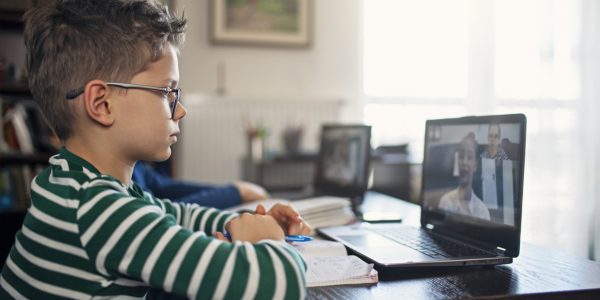
19/02/21
3 min read
Research on the reopening of schools, published today by the IFS, finds how the return to school is managed is just as important as when. An optional return risks widening the gaps between disadvantaged students and their better-off peers. Even if the return to school is compulsory and soon, substantial additional support for poorer pupils is needed.
Funded by the Nuffield Foundation, the research is based on data collected in England during last Spring and Summer, when schools re-opened after the first national lockdown. It finds that:
- During the first lockdown, the longer schools were closed, the less work pupils did. Primary school children who were not offered the chance to return to school spent around 3½ hours a day learning in June/July, 15% less than at the start of the lockdown in April/May and well below the 6 hours a day of learning time that primary pupils got before the pandemic. Secondary school pupils saw their learning time fall even faster over the period they were out of school.
This reinforces the case for a full return to school to be at the very top of the priority list.
- Once schools started to reopen, pupils from better-off families were far more (50% more) likely to take up the offer to return to school in June/July last year than their more disadvantaged peers. Among primary school children offered the chance to return to school, just over half (56%) of those in the poorest fifth of families went back to the classroom, compared with five in six (83%) of those in the richest fifth.
This suggests that there is a risk that a voluntary return to school in March will further widen the gaps that the pandemic has already exacerbated.
- Children from better-off families not only spent more time learning at home than their disadvantaged peers – they also increased their learning time by more when they returned to the classroom.
Substantial targeted support will be needed to help disadvantaged pupils catch up, even after all children are back in the classroom.
Other findings include:
- School reopenings boosted total learning time. Primary school students who returned to school, at least part-time, in June/July saw their learning time rise by over an hour a day.
- Surprisingly, even children who chose not to return to school benefitted somewhat from having the option to go back: their learning time held steady instead of continuing to fall. These pupils did not receive substantially better learning resources, but parents and children might have been encouraged to focus on home learning to keep up with peers in the classroom. A phased return to school will likely widen the gaps between children in different year groups.
- Last summer, school reopenings were primarily driven by a child’s age; around three-quarters of children in the ‘priority’ year groups were offered at least some in-person schooling, compared with a quarter of those in other years. Encouragingly, we find no evidence that schools attended by disadvantaged students were less likely to reopen. In classes that reopened, schools did not pull back on their provision of resources such as online classes, suggesting they felt able to manage a concurrent programme of in-person and remote learning.
- Among poorer families, the primary concerns with returning to school last summer were health risks to the child, health risks to the wider family and a reluctance to be the first to go back. Government, schools and local authorities should be working to address parents’ concerns and provide reassurance about the return to school.
The fact that children from poorer families were less likely to return to school at the earliest opportunity last year, and in many cases were less able to engage with remote schooling, reinforces the need for sustained and targeted support for those pupils when they do return. Realistically, many parents will delay sending their children back to school whatever the policy is on prioritising particular groups for a return to the classroom, and that will increase the learning gap in the summer term and into the next school year.Josh Hillman, Director of Education, Nuffield Foundation
Adam Salisbury, a Research Economist at IFS, said:
“Despite schools’ and policymakers’ efforts to improve home learning during the first lockdown, pupils who remained at home were spending less time learning in June and July than they had been at the start of the pandemic. These falls were particularly big among secondary school pupils. The lack of ‘settling in’ to home learning means that, for students who were out of school over the whole period from March to September, learning loss per week likely got worse rather than better.”
Christine Farquharson, a Senior Research Economist at IFS, said:
“In light of the enormous costs that school closures have for children’s learning, the consensus on prioritising getting pupils back to school as soon as public health allows is welcome. But decisions about how schools reopen are perhaps even tougher than decisions about when. Prioritising certain year groups widens the gaps between children of different ages. A voluntary return to school from 8 March risks widening inequalities further if the poorest children stay home while their better-off peers choose to return to the classroom. We are going to need a big programme of support for pupils to undo some of the damage the pandemic has caused.”
















































